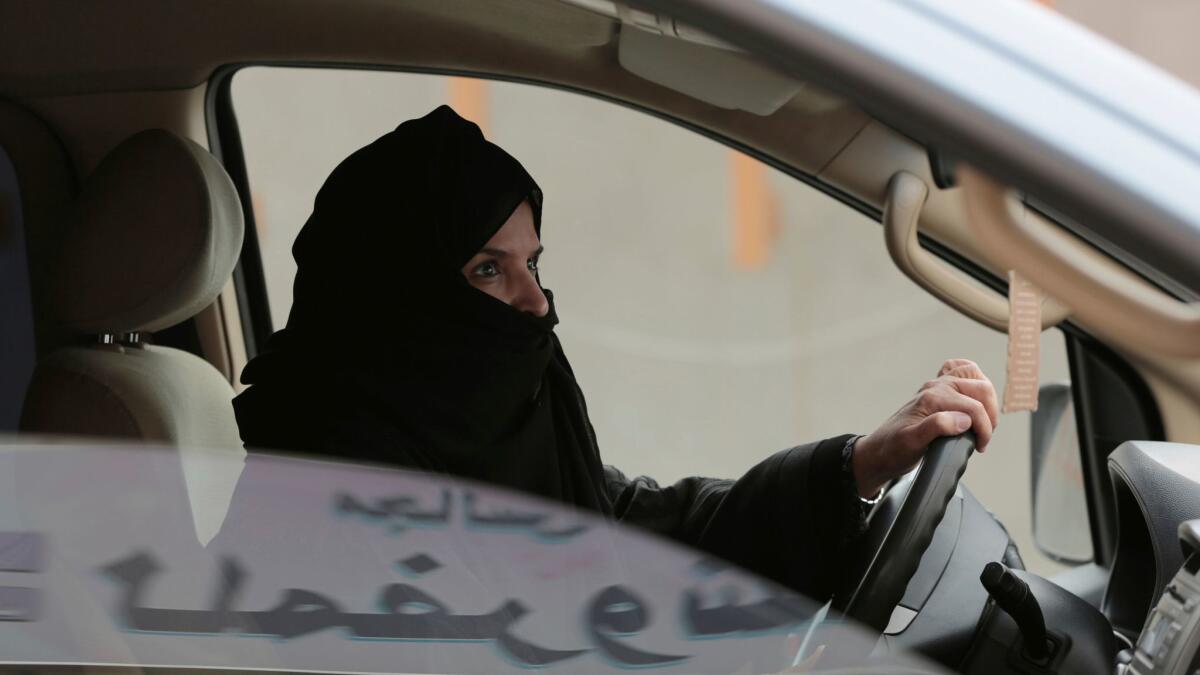Editorial: Give Saudi women a license not just to drive, but to run their own lives

It’ll be close, but it looks like women will be allowed to drive in Saudi Arabia with some time to spare before the automobile industry converts entirely to self-driving cars.
A royal decree announced Tuesday that women would finally be allowed behind the wheel, heralding a preposterously overdue end to the most high-profile and infamous of the repressive kingdom’s restrictions on women. While there are a few other Middle Eastern and conservative Islamic countries where driving by women is culturally or religiously frowned upon, Saudi Arabia is the last country on the planet that officially prohibited it.
And it’s not a reality yet. Driver’s licenses won’t be issued until June. The government says it will first form a panel to look into implementing the order, then create the infrastructure it claims is necessary to put the order into effect. However, the order seems likely to be carried out.
The Saudi government has pledged to abolish the guardianship system. But this has yet to happen.
In recent years, some Saudi women have launched protests of the ban — defying it and, in some cases, getting arrested for doing so. Meanwhile, by allowing women to vote and to run in municipal elections, the Saudi royal family has finally begun to nudge the country if not into the modern era, at least out of the Paleozoic.
As profound as Tuesday’s announcement may be, though, it is a reminder that even more draconian constraints on women remain in place in Saudi Arabia.
The worst of these is the country’s oppressive system of male guardianship. All Saudi women, for their entire lives, must have a male guardian who is a relative — a husband, a father, a brother, even a son — who signs off on all their significant decisions. Women must have permission from a guardian to marry, apply for a passport, travel abroad, rent an apartment, file a legal claim and, in some cases, get healthcare. A woman cannot study abroad on a government scholarship without permission — and then she must be accompanied by a male guardian.
While a guardian’s permission is not required by the government for women to work, there is no law against employers requiring it, and they sometimes do. Even a woman in prison requires a male guardian to agree to her release, according to the monitoring group Human Rights Watch, which described the guardianship system as the most significant impediment to women’s rights in Saudi Arabia — and even a barrier to the government’s own plans to improve the economy.
Saudi Arabia has perpetuated this unconscionable system even after signing on to the United Nations Convention on the Elimination of All Forms of Discrimination against Women in 2000. Since then, the Saudi government has pledged to abolish the guardianship system and enable women to contribute productively to society and to the economy. But this has yet to happen.
There’s no question that the Saudi government has heard and acknowledged the calls for change, not just from its own countrywomen but also from governments and human rights advocates around the world. And it is being pushed in the right direction by King Salman and his son, the reform- and public-relations-minded Crown Prince Mohammed bin Salman. But the government is still swayed by some ultraconservative clerics and still grappling with its society’s more conservative elements.
Truly transforming Saudi Arabia means giving women a license not just to drive, but also to run their own lives without anyone else’s permission. The abolition of the male guardianship system should be the next announcement we hear from the Saudi government.
Follow the Opinion section on Twitter @latimesopinion or Facebook
More to Read
A cure for the common opinion
Get thought-provoking perspectives with our weekly newsletter.
You may occasionally receive promotional content from the Los Angeles Times.










